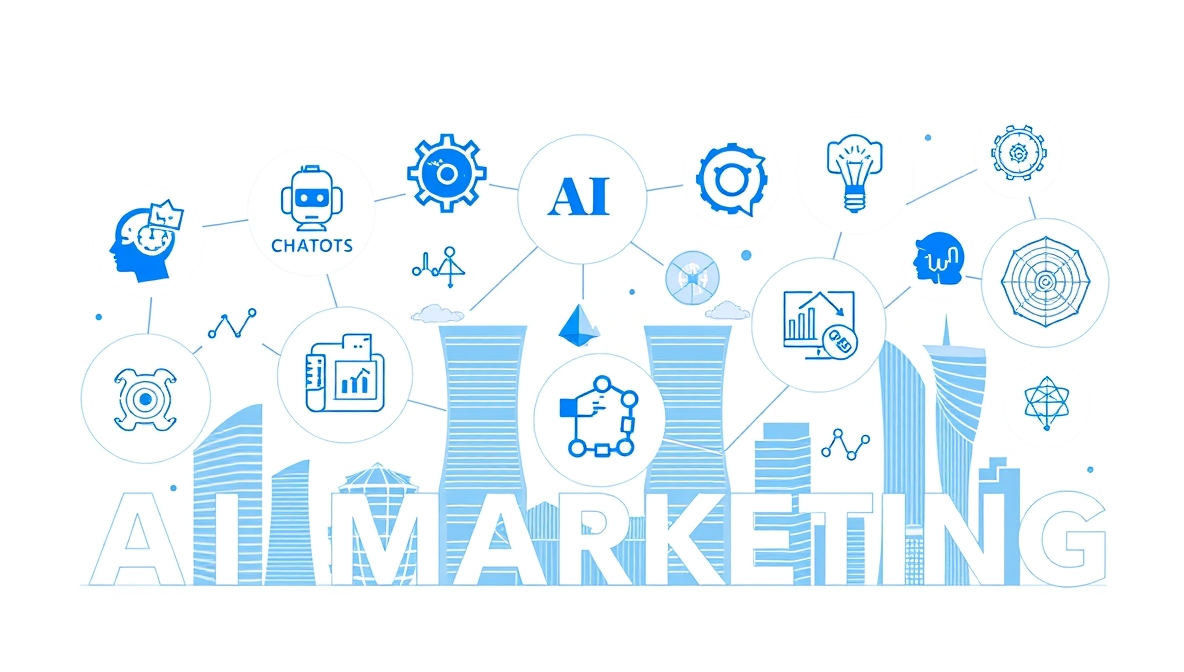The Rise of AI Marketing in Singapore
Singapore isn’t just keeping pace with global marketing trends—it’s setting the bar. In an era where consumers are bombarded with information at every turn, businesses need smarter, sharper strategies to stand out. This is where AI Marketing takes center stage.
AI Marketing is not a buzzword—it’s the evolution of how brands communicate. Unlike traditional methods that cast a wide net and hope for the best, AI empowers businesses to cut through the noise with precision. Whether it’s predicting customer needs, automating personalized campaigns, or analyzing mountains of data in seconds, AI transforms the way companies build authentic connections.
In Singapore, where competition is fierce and consumer expectations are sky-high, adopting AI in marketing isn’t optional—it’s essential. Businesses that embrace this shift are not just staying relevant; they’re thriving. From SMEs to global corporations, the city-state’s marketing ecosystem is rapidly pivoting to AI-driven strategies that speak directly to the hearts and minds of audiences.
This article dives into why Singaporean businesses are turning to AI, how personalization is redefining consumer engagement, and what tools, challenges, and future trends will shape the marketing landscape. If you’re ready to discover how to make your brand impossible to ignore in Singapore’s fast-paced digital marketplace, read on.

Why Singapore Businesses Are Turning to AI Marketing
Singapore has always been a hub for innovation. With its strong digital infrastructure, tech-savvy population, and highly competitive business environment, the country is fertile ground for AI adoption. Marketing here isn’t just about running campaigns—it’s about delivering impact. And AI provides the muscle to achieve just that.
One key reason businesses are leaning into AI Marketing is efficiency. Traditional marketing eats up time, manpower, and resources, often with mixed results. AI flips the script by automating repetitive tasks—like customer segmentation, lead scoring, and campaign optimization—freeing up teams to focus on creativity and strategy. The result? Faster execution, smarter decision-making, and measurable ROI.
Another driving factor is consumer expectation. Singaporean audiences are digitally literate and demand experiences tailored to their needs. Generic ads don’t cut it anymore. AI steps in by analyzing consumer behavior in real-time, predicting future actions, and personalizing engagement at scale. That means delivering the right message, to the right person, at the right time—every single time.
For local businesses, this isn’t just about survival—it’s about growth. Companies that ignore AI risk falling behind in a market that rewards agility and precision. Those that embrace it gain a competitive advantage, building stronger customer relationships and driving profitability. In short, AI is no longer an optional add-on; it’s the new engine powering Singapore’s marketing success stories.

Personalization at Scale: How AI Speaks to Your Audience
At the heart of AI Marketing lies one powerful promise: personalization at scale. In a city like Singapore, where diversity thrives, this ability is a game-changer. It’s no longer enough to blast out generic messages—consumers expect brands to understand them as individuals.
AI makes that possible. By crunching data from multiple touchpoints—social media, browsing history, purchase behavior, and even real-time interactions—AI creates hyper-detailed customer profiles. From there, it predicts what customers want next, enabling brands to tailor their messages with uncanny accuracy.
Imagine an e-commerce brand in Singapore that not only recommends products based on past purchases but also anticipates needs before the customer even articulates them. That’s the magic of predictive personalization. The consumer feels understood, and the brand builds loyalty with every interaction.
But personalization isn’t just about product recommendations. It extends to email campaigns, chatbots, dynamic website content, and even ad targeting. Instead of wasting ad spend on disinterested audiences, businesses can zero in on individuals who are most likely to convert.
This level of personalization fosters a sense of connection between brands and consumers—a rare commodity in today’s crowded marketplace. It’s the difference between being another brand in the noise and becoming the brand your customer trusts. And in Singapore, where customer loyalty can make or break a business, that difference matters.

AI Tools and Platforms Popular in Singapore
The AI Marketing ecosystem is rich with tools designed to supercharge campaigns. In Singapore, businesses are increasingly adopting these platforms to stay ahead of the curve.
One of the most widely used categories is customer data platforms (CDPs). These systems consolidate data across channels, giving businesses a unified view of each customer. This foundation makes hyper-personalization possible. Platforms like Salesforce Einstein and Adobe Sensei are gaining traction for their advanced analytics and automation capabilities.
Chatbots powered by AI are another favorite in Singapore. Brands across retail, finance, and hospitality deploy them to handle customer queries 24/7, cutting costs while improving service quality. These bots aren’t just automated responders—they learn from interactions, becoming smarter over time.
On the advertising front, programmatic ad platforms are helping businesses reach the right audience with laser accuracy. Tools like Google Marketing Platform and The Trade Desk allow for real-time bidding and targeting, ensuring ad dollars are spent effectively.
Even small and medium-sized enterprises (SMEs) are tapping into AI tools tailored for affordability and scalability. Platforms like HubSpot and Zoho offer AI-driven features such as predictive lead scoring and automated content suggestions, making advanced marketing accessible without breaking the bank.
For Singaporean businesses, the choice of tools comes down to one thing: impact. AI platforms that enhance personalization, efficiency, and ROI are becoming the gold standard for modern marketing strategies.

Case Studies: AI Marketing Success Stories in Singapore
Nothing proves the power of AI Marketing better than real-world results. Several Singapore-based businesses have already demonstrated how AI can transform customer engagement and drive growth.
Take the retail sector, for example. A leading fashion brand in Singapore integrated AI-powered recommendation engines into its e-commerce platform. The result? A significant increase in cross-selling opportunities and a 25% boost in average order value. Customers felt the store “knew” their style preferences, making every shopping experience seamless and enjoyable.
In the financial services industry, one local bank implemented AI chatbots to handle customer inquiries. Beyond providing round-the-clock support, the bots learned from interactions, offering increasingly personalized financial advice. Customer satisfaction rates surged while call-center costs dropped dramatically.
Hospitality is another standout sector. A luxury hotel chain in Singapore adopted AI-driven sentiment analysis to monitor guest feedback across online platforms. By proactively addressing concerns, they not only improved service quality but also saw a noticeable rise in positive reviews and repeat bookings.
These success stories underline a clear message: AI isn’t just about technology—it’s about people. When businesses leverage AI thoughtfully, they create marketing strategies that resonate with customers on a deeper level. And in Singapore’s competitive marketplace, those connections are what separate the leaders from the rest.

Challenges and Ethical Considerations of AI Marketing
As powerful as AI Marketing is, it doesn’t come without challenges. In Singapore, where data privacy and regulatory compliance are taken seriously, businesses must tread carefully.
One of the biggest concerns is data privacy. AI relies heavily on customer data, and mishandling that data can lead to breaches of trust—and legal repercussions under Singapore’s Personal Data Protection Act (PDPA). Transparency about how data is collected and used is no longer optional; it’s a necessity for building consumer confidence.
There’s also the issue of over-automation. While AI can personalize experiences, relying too heavily on algorithms risks making interactions feel impersonal. Striking the right balance between machine efficiency and human empathy is key.
Ethical considerations also come into play. Algorithms can unintentionally perpetuate biases, leading to skewed marketing outcomes. Brands must be vigilant in monitoring their AI systems to ensure fairness and inclusivity.
Finally, the cost and complexity of AI tools can be a barrier, particularly for SMEs. While the technology is becoming more accessible, there’s still a learning curve that requires investment in training and expertise.
Despite these hurdles, the opportunities outweigh the risks. Businesses that approach AI Marketing responsibly—by prioritizing data ethics, customer trust, and human oversight—will not only avoid pitfalls but also position themselves as leaders in the evolving digital space.

The Future of AI Marketing in Singapore’s Digital Landscape
The future of marketing in Singapore is AI-driven, and the momentum shows no signs of slowing down. Emerging technologies like generative AI, voice recognition, and advanced predictive analytics are pushing the boundaries of what’s possible.
Generative AI, for instance, is revolutionizing content creation. From writing copy to designing visuals, it helps brands create high-quality marketing assets faster and at scale. Meanwhile, AI-powered voice assistants are changing how consumers interact with brands, making conversational commerce a growing trend.
Another frontier is predictive analytics. As these systems get more advanced, businesses will be able to forecast consumer behavior with stunning accuracy—allowing them to anticipate needs before they arise.
For Singaporean businesses, the message is clear: the time to prepare is now. Investing in AI infrastructure, upskilling teams, and embracing innovation will be the difference between thriving and merely surviving in the years ahead.
In a digitally saturated market, the future belongs to brands that can cut through the noise and make their audience feel truly seen. AI isn’t just shaping that future—it’s defining it.
Conclusion: Embracing AI to Speak Directly to Your Audience
AI Marketing is no longer a luxury—it’s the lifeline of modern business in Singapore. From hyper-personalization and smarter tools to real-world success stories, the evidence is overwhelming: AI doesn’t just improve marketing, it transforms it.
Yes, there are challenges—data privacy, ethics, and accessibility—but these are not roadblocks. They’re opportunities for brands to prove their integrity, adaptability, and vision. Businesses that approach AI with responsibility and creativity will find themselves connecting with customers in ways that were once impossible.
In Singapore, a place where innovation thrives and consumer expectations keep rising, the brands that embrace AI will be the ones that truly resonate. They’ll not only speak to their audiences—they’ll speak directly to their hearts.





